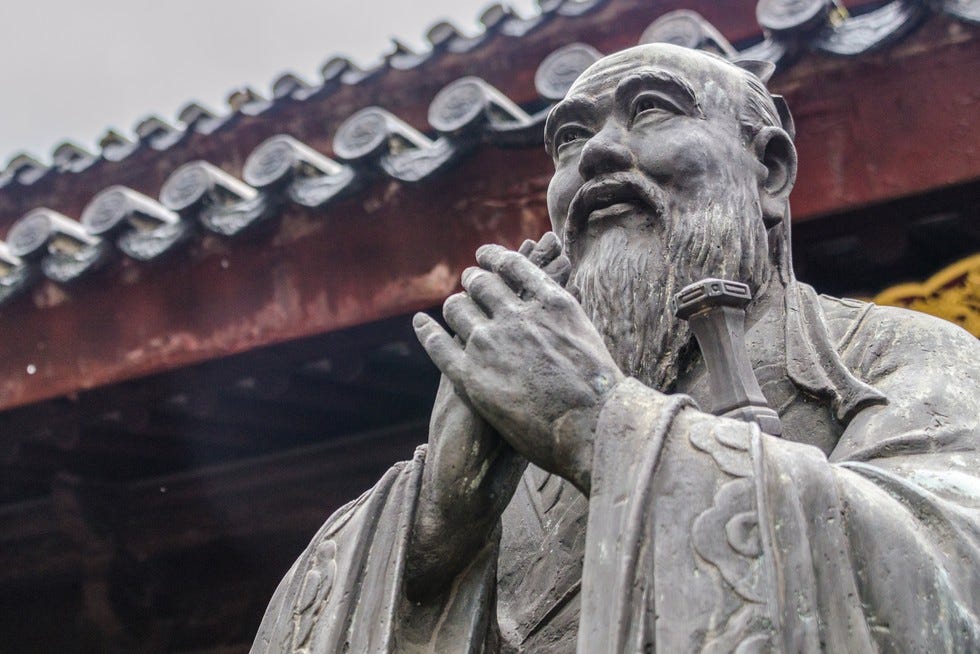Ethical roots of Chinese AI
Western AI influencers often fear Chinese AI, but where does it come from? Let's try to scratch the surface
I’m doing my PhD thesis on the philosophy of mind, and this article is an adaptation of my initial research into artificial consciousness. I’ve picked China as (1) I have a minor in Chinese language & culture; (2) I see this topic as severely neglected considering the co-leading role of China in the AI space.
Below you’ll find a high-level description of what underpins particular decisions to implement ML algorithms in China. As well as some hypotheses on the structure of this whole process, i.e. how it happens so that the same models are used differently — ethically and legally.
The rise of Artificial Intelligence (AI) stands as a transformative force in our world, akin to the monumental shifts brought by the printing press or the Internet. Different cultures interact with AI in ways that reflect their unique values and philosophies. Take China and the West: their approaches to AI, influenced by distinct philosophical traditions, have diverged notably since the late 1990s.
China, while adopting Western technological insights, began charting its own AI course by the end of the 20th century. While American AI development, driven by the Protestant ethic, often prioritizes individualism and AI autonomy, China's approach, embedded in Confucianism, stresses social harmony and the integration of AI into society.
But Confucianism isn't the whole story. Other philosophies such as Legalism, Chinese Communism, and Taoism also blend into China's unique AI strategy. While Confucianism leads in shaping ethics in AI, these other schools of thought provide a comprehensive backdrop, making China’s AI development not just a technological leap, but also a cultural and philosophical journey since the late '90s.
In my research methodology, the goal wasn’t only to identify the underlying philosophies but also to understand how their principles are reflected in the ethics of modern tech. To do this, I’ve attempted to systematically trace the reflection of the fundamental concepts of Confucianism, Legalism, and Communism (and to a lesser extent, Taoism) in modern Chinese AI ethics and management.
I.Philosophy
Confucianism is at the heart of this discussion, dating back to the 5th-6th centuries BC. It’s more than a philosophy — it's a blueprint for societal harmony. Key principles of Confucianism include:
Ren (仁): Symbolizing humanity or philanthropy, it promotes compassion in our interactions.
Yi (义): Representing justice, stresses moral righteousness and fairness.
Li (礼): Focusing on etiquette, dictates proper conduct and social rituals.
Zhi (智): Denoting wisdom, encourages informed and thoughtful decision-making.
Xin (信): Meaning honesty, underlines the importance of trust and integrity.
Legalism, another influential philosophy from the 4th-3rd centuries BC, contrasts Confucianism, prioritizing strict laws, centralized authority, and results-driven governance. Its core principles are:
Strict legal enforcement: Emphasizing rigid laws and harsh penalties for violations.
Centralized power: Advocating strong government control in directing society.
Meritocracy: Encouraging positions and promotions based on abilities and achievements.
Emphasis on results: Valuing practical outcomes and performances.
State-led ideology: Controlling societal beliefs and viewpoints through governance.
Chinese Communism, evolving significantly since its adoption from the USSR in 1949, integrates state control with elements reminiscent of Western economies. Its key tenets include:
State ownership: Dominating the means of production and resources.
Collectivism: Prioritizing the group's needs over individual desires.
Taoism, traditionally linked to Lao Tzu and the Tao Te Ching, subtly but powerfully influences Chinese thought. Important Taoist concepts are:
Wu-Wei (无为): Advocating non-action and alignment with the natural order.
Yin-Yang (阴阳): Seeking balance and harmony in life.
Ziran (自然): Emphasizing spontaneity and being true to one's nature.
II. Law
Now that we’ve outlined the most important teachings, we’ll make a giant leap to jurisprudence: the hardest and the most artistic part of this analysis is to source relevant principles without an ability to sustainably link them to the sources. Everything is open to interpretation here, and here’s mine.
Exploring China's AI journey involves delving into critical documents that reveal its strategy and ethical considerations. I believe that since such documents embody the will of the state and active scholars, it’s wise to look for principles there. Below are some docs I’ve explored:
New Generation Artificial Intelligence Development Plan(新一代人工智能发展规划)— by the Chinese State Council.
Joint Pledge on Self-Discipline in the AI Industry(人工智能行业自律公约)— by China's Artificial Intelligence Industry Alliance.
Principles for AI Governance and Responsible AI(新一代人工智能治理原则——发展负责任的人工智能)— by the Chinese Ministry of science and technology (aka MOST).
III. Ethics
I’ve attempted to summarize principles (un)directly stated in these docs. In short, I’ve looked for the principles and values from part I, but in the current legal base. The ethical backbone of AI in China, drawn from these key documents, therefore highlights the following:
Harmonious Development: Rooted in Confucianism and Taoism, this foundational principle emphasizes societal balance.
Human-Centricity: Reflecting Confucian humanity, AI should prioritize human welfare and ethical considerations in its evolution.
Social Stability and Responsibility: This principle incorporates Confucian harmony, Legalist rule of law, and collective state and societal responsibility.
Justice and Equality: Here, Confucian honesty and Legalist legal principles converge to ensure fairness in AI applications.
Long-Term Prosperity: Taoism's Ziran, advocating for the natural order, informs sustainable, forward-looking AI development.
Inclusiveness and Sharing: Echoing collectivist values, this principle focuses on communal benefits and shared progress.
Safety and Controllability: Reflecting modern Communist party management strategies, it underscores the importance of secure and manageable AI systems.
Collaborative and Flexible Management: Once more, the theme of harmony is evident, advocating for adaptable and cooperative AI governance.
While I was able to infer these principles' roots in Chinese philosophies, explicit connections aren't always clear in contemporary discussions. Often, I deduced these links through contextual analysis rather than direct references.
IV. Practice
China is ambitiously striving to lead the global AI arena by 2030, tightly weaving AI into its national development blueprint. AI isn't just a tech trend here; it's a pivotal element in the country's overall progress and societal evolution. Chinese leadership does take AI seriously.
This national strategy unifies efforts from state government to local authorities, as well as tech giants like Alibaba, Tencent, and Baidu, and academic & research communities. This collective drive has turned China into a hub for AI innovations, from pioneering facial recognition tech to revolutionizing e-commerce and developing "smart cities”.
In its strategic plan, China places a strong emphasis on AI ethics. There is a bigger picture in place: the objectives of AI research, funding sources, how research syncs with policy, ensuring AI safety, and responsibility in AI tech development and use. This comprehensive view underscores how deeply embedded these principles are in Chinese technological endeavors.
Let's delve into three exemplary applications of AI in China, analyzing how these align with the country's overarching ethical framework:
1. Facial Recognition in Security and Services: China's extensive use of facial recognition, ranging from enhancing security to streamlining consumer experiences (such as facial payment systems in stores and restaurants, and expedited checks in public transport), underscores the "Safety and Controllability" principle. This technology boosts public security and operational control. However, there's a tension between this and the "Human-Centricity" principle, which favors putting human needs and comforts first, such as consumer convenience in daily transactions. "Social Stability and Responsibility" is also a driving force, as technology aids in maintaining societal order. Notably, the principle balance here shifts towards public safety, contrasting with regions like California, where privacy concerns have led to legislative bans on mass facial recognition.
2. AI in E-Commerce and Customer Service: Giants like Alibaba leverage AI for personalized shopping experiences, automated customer support, and logistics efficiency, aligning with the "Human-Centricity" principle through tailored consumer services. The commitment of these companies to continuous improvement and innovation also reflects the principle of "Long-Term Development and Prosperity." Additionally, "Justice and Equality" emerge in AI's role in offering each customer personalized, equitable service levels.
3. Smart Cities and Social Media Applications: China's push towards "smart" cities, integrating AI for traffic management, energy efficiency, and environmental conservation, resonates with the "Harmonious Development" principle, aiming for an enhanced, balanced urban life. The principle of "Collaboration and Flexible Management" is visible in the amalgamation of different technologies to address urban challenges comprehensively. Furthermore, platforms like Toutiao, using AI to tailor content, demonstrate "Inclusiveness and Sharing," ensuring content relevance for a diverse user base.
Are ethical principles shaping AI development essential? It's a tricky question. Looking at AI in isolation, the answer might seem unclear. But a closer look reveals key differences, especially compared to approaches in places like the U.S. Take facial recognition regulation as an example — it's heavily influenced by underlying ethical views.
In China, AI development isn't just a technological march forward; it's deeply entwined with age-old philosophical and cultural values, primarily Confucianism. This philosophy, emphasizing harmony, justice, and virtue, significantly shapes China's approach to AI. It's not just about building smarter systems but also about how these systems align with societal values.
Moreover, collectivism in Chinese culture, valuing the society over the individual, plays a big part in how AI is perceived and accepted. And let's not forget the government's heavy hand in this. The collaboration between the state and both the corporate and academic worlds in China mirrors a broader strategy of state intervention and long-term planning. It's a complex blend of philosophy, culture, and politics that's fueling the AI trend in China.
P.S. Among the sources used to prepare this article, I’ve found the following useful and inspirational:
Artificial intelligence with American values and Chinese characteristics: a comparative analysis of American and Chinese governmental AI policies — by Hine, Floridi.
The Chinese approach to artificial intelligence: an analysis of policy, ethics, and regulation — by Wang, Floridi et al.
AI nationalism — by Hogarth.
Building ethics into artificial intelligence — by Yu, Shen et al.
Deciphering China’s AI Dream: the context, components, capabilities, and consequences of China’s strategy to lead the world in AI — by Ding of the Future of Humanity Institute.







